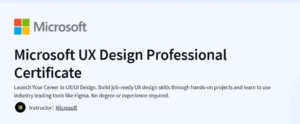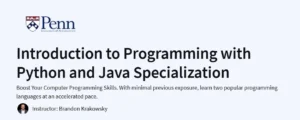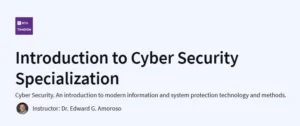What you will learn in Object Oriented Programming in Java Specialization
Master object-oriented programming (OOP) concepts in Java, including encapsulation, inheritance, and polymorphism.
Develop proficiency in Java programming using development environments like BlueJ and Eclipse.
Design and implement Java applications capable of managing and processing large datasets.
Create graphical user interfaces (GUIs) and interactive applications using Java.
Program Overview
Java Programming: Solving Problems with Software
⏳ 18 hours
- Learn to code in Java and improve your programming and problem-solving skills. Topics include designing algorithms, developing and debugging programs, and working with data types.
Java Programming: Arrays, Lists, and Structured Data
⏳ 19 hours
- Build on your software engineering skills by learning new data structures. Use these data structures to build more complex programs that use Java’s object-oriented features.
Object Oriented Programming in Java
⏳ 20 hours
- Understand the fundamentals of OOP in Java, including classes, objects, and interfaces. Learn to leverage existing libraries, build GUIs, and implement core algorithms for data processing.
Data Structures and Performance
⏳ 22 hours
- Learn about data structures such as linked lists, trees, and hash tables. Analyze their performance and understand how to use them effectively in Java applications.
Get certificate
Job Outlook
Completing this specialization prepares you for roles such as Java Developer, Software Engineer, or Backend Developer.
The skills acquired are applicable across various industries that utilize Java for software development.
Enhance your employability by gaining practical experience in Java programming and object-oriented design.
Specification: Object Oriented Programming in Java Specialization
|
FAQs
- Java is still among the top programming languages globally.
- Used in enterprise applications, banking systems, and Android apps.
- Highly valued for scalability and security.
- Widely taught in universities and industry training.
- A stable choice for long-term career growth.
- No Java background is required.
- Basic logical thinking helps but isn’t mandatory.
- The course builds step-by-step from fundamentals.
- Exercises and projects reinforce understanding.
- Prior exposure to coding concepts is an advantage, not a requirement.
- Offers structured progression across multiple modules.
- Covers both theory and hands-on projects.
- Includes OOP design principles, not just syntax.
- Provides exposure to GUIs, data structures, and performance.
- Ends with practical applications and portfolio-ready projects.
- Builds solid foundations in Java syntax and OOP.
- Covers common interview topics like data structures.
- Strengthens problem-solving with coding assignments.
- Prepares you to discuss design principles confidently.
- Additional practice with LeetCode/HackerRank may still be required.
- Entry-level Java Developer or Software Engineer.
- Backend Developer for enterprise applications.
- Android Developer (with additional mobile frameworks).
- QA Automation Engineer using Java-based tools.
- Foundation for progressing into full-stack or cloud development.





